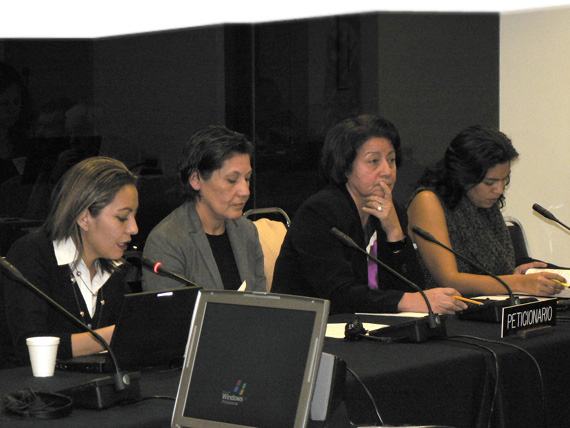|
A delegation of
the Bajo Aguán International Mission traveled to Washington to present its
preliminary report at the 141st Session of Public Hearings of the
Inter-American Commission on Human Rights (IACHR), and was judged very positive
results by participants. SIREL interviewed Ana María Pineda, of FIAN Honduras,
about the leading results.
-What were the
expectations of the delegation that traveled to Washington?
-For us it was
important to give international visibility to the serious situation of human
rights abuses in Bajo Aguán, as a continuation of the investigation efforts
conducted some weeks ago by the International Mission and several
national organizations.
-What were the
main results of your efforts?
-It was a very
successful experience. We delivered the preliminary report to Felipe González,
the Rapporteur for Honduras appointed by the Inter-American Commission on Human
Rights (IACHR), and he expressed his concern over the situation in Bajo
Aguán.
We also
discussed possible future actions, such as, for example, the need for the
IACHR to continue monitoring the situation closely, and to issue a call to
attention to the Honduran state.
The IACHR
must demand that the government report on what it is doing to prevent abuses
and to protect individuals, because what we have found in our on site
investigation is that there is complete impunity for human rights violators.
-What other
spaces were you able to present the Bajo Aguán issue at?
-We
participated in an IACHR public hearing on the situation of human rights
activists in Honduras.
We gave a
detailed presentation of the Mission’s leading findings, explaining the
great concern of the international and national organizations that participated
in the Mission, and the recommendations issued to the state of
Honduras and the international community.
This helped us
put the Bajo Aguán problem at the center of the IACHR’s discussions and
activities, clearly explaining the complexity and severity of a situation that
is the result of an rural conflict caused by an exploitative production model, a
land-hoarding process, and the coup.
-How did the
Honduran state refute the claims presented?
-It was
incredible, because the Honduran state delegation had absolutely no arguments to
refute any of our claims, and could only excuse themselves saying they didn’t
know the Bajo Aguán situation would be on the agenda.
It’s obvious
that it’s something they have no justification for and they preferred not to say
anything. They contradicted themselves throughout the entire hearing, and that
led the IACHR members to issue strong recommendations to the state.
-You also had
some meetings at the World Bank...
-We met with
representatives of the Compliance Advisor Ombudsman (CAO) to request that
it conduct an investigation of the situation in Bajo Aguán and suspend the palm
oil project for which in 2009 the International Financial Corporation (IFC)
- a member of the World Bank Group - granted Miguel Facussé’s
Corporación Dinant a loan for.
Lastly, we were
part of a delegation that met with the OAS diplomatic representatives of
Ecuador, Brazil, and Venezuela, and we submitted the
Mission report to them.
-What is your
evaluation of the delegation’s efforts in Washington?
-The visit was
extremely positive and the results were much better than we expected. But the
efforts don’t end here, as this has opened up many possibilities to follow up on
in the future.
 |